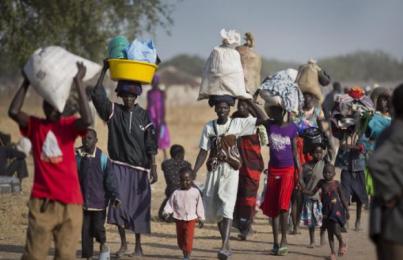International experts warn of fragmentation in South Sudan
January 19, 2016 (JUBA) – Experts from international organizations have warned of further conflict and fragmentation in the war-ravaged South Sudan as parties to the conflict seem to be unsuccessful to implement the peace deal they signed in August last year.

“On 22 January, just over 25 months after the start of the civil war in South Sudan, the scheduled formation of the Transitional Government of National Unity will be one of the first major milestones in the peace process. The swearing in of the transitional government would be enormous progress, but nothing in South Sudan is certain and the event may just as easily be postponed,” partly reads the report extended to Sudan Tribune on Tuesday.
“Otherwise, the human cost will likely be tremendous and the country might even risk complete fragmentation,” it added.
The report outlined five possible scenarios for South Sudan’s future, developed through extensive consultation with a diverse group of South Sudanese actors.
“In the best scenario, ‘United in diversity’, the 2015 peace agreement is implemented and the peace process consolidated and deepened. Two scenarios, ‘Dictatorship’ and ‘21 Kingdoms’, show at what tremendous cost, in human lives and repression, the victory of either side may come. One scenario, ‘Divided leadership’, illustrates how a badly implemented peace process will lead to renewed war. The last scenario, ‘Fragmentation’, explores how the continuation of war may lead to a complete breakdown of governance,” the report enumerated.
It said since signing the South Sudan peace agreement, President Salva Kiir’s government and Riek Machar’s armed opposition have frequently confirmed their adherence to the implementation process, but yet violent confrontations and human rights abuses have continued, adding that the parties seemed to be more interested in victory than in peace.
“In spite of all the obstacles, I remain hopeful, as the leaders of South Sudan still have the opportunity to pull their country out of the miseries of war and move towards a ‘United in diversity’ scenario,” says Andrea Minalla, PAX Project Manager in South Sudan.
Jaïr van der Lijn, head of SIPRI’s Peace Operations and Conflict Management team and author of the report, warns: “However, if South Sudan’s leaders continue to believe that they can potentially win the war, then I am very pessimistic, because then the fragmentation of the country is regrettably a very likely scenario. In such a scenario, I am afraid also the international community is unlikely to come to the rescue, in spite of the horrific human suffering and large refugee flows.”
The scenarios, the report explained, are intended to gather thoughts on possible long-term developments, stimulate open debate and may assist South Sudan and its international partners in preparing for the future.
Based in Netherlands, PAX works with involved civilians and partners in areas of war to protect human security, to prevent and end armed violence, and to build peace with justice. The organization has been engaged with (South) Sudan for over 20 years and operates independently of political interests.
Meanwhile, SIPRI is an independent international institute dedicated to research into conflict, armaments, arms control and disarmament.
Established in 1966, SIPRI provides data, analysis and recommendations, based on open sources, to policy makers, researchers, media and the interested public.
(ST)
